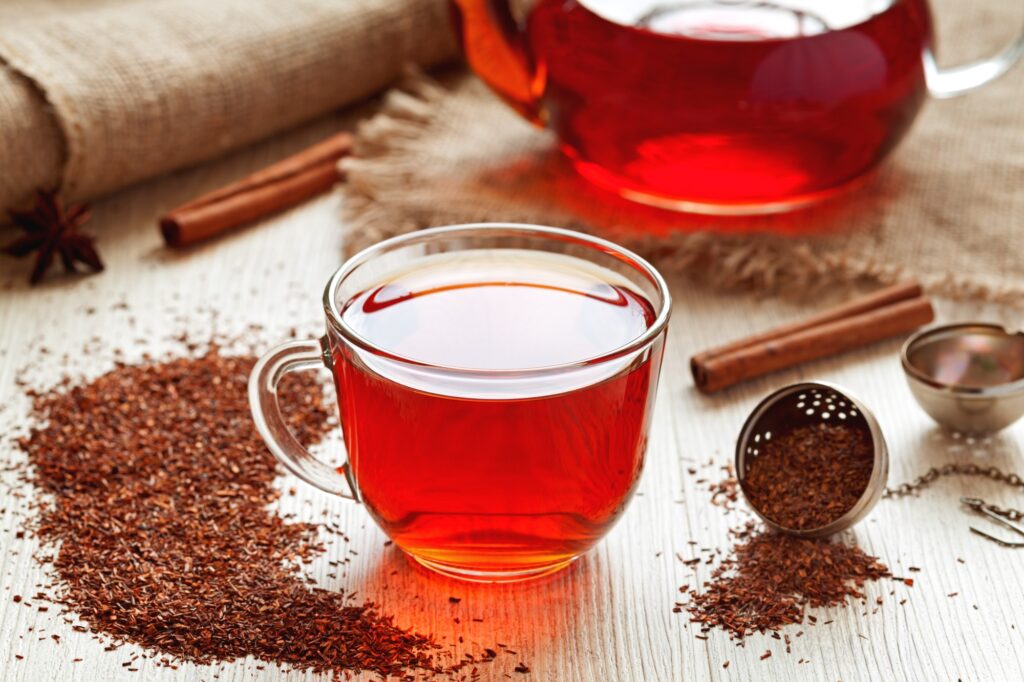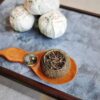
Rooibos tea, also known as red bush tea, is a unique and flavorful beverage that has been gaining immense popularity worldwide. Originating from the Cederberg region of South Africa, this herbal infusion is made from the leaves of the Aspalathus linearis plant, a shrub native to the region. With its distinct reddish-brown hue and delightful taste, rooibos tea offers a refreshing and nourishing experience that extends beyond its appealing flavor.
The Origins and History of Rooibos Tea
The history of rooibos tea dates back to the 18th century when the indigenous Khoi and San people of South Africa first discovered and consumed the plant. Initially, they harvested the leaves and stems of the Aspalathus linearis plant, which they called “Khoisan bush tea.” The name “rooibos” is derived from the Afrikaans language, meaning “red bush,” referring to the plant’s distinctive red-brown color after fermentation.
It wasn’t until the early 20th century that rooibos tea gained commercial recognition. In 1904, a Russian immigrant named Benjamin Ginsberg realized the potential of this unique beverage and began cultivating and processing the plant on a larger scale. Today, rooibos tea is primarily grown in the Western Cape region of South Africa, where the climate and soil conditions are ideal for its cultivation.
The Nutritional Content of Rooibos Tea
Rooibos tea is renowned for its rich nutritional profile, making it a valuable addition to a healthy diet. Here are some of the key nutrients found in this remarkable beverage:
- Antioxidants: Rooibos tea is an excellent source of antioxidants, including polyphenols, flavonoids, and unique compounds like aspalathin and nothofagin. These antioxidants help neutralize harmful free radicals in the body, reducing oxidative stress and promoting overall well-being.
- Minerals: Rooibos tea is rich in essential minerals such as calcium, iron, potassium, copper, zinc, and magnesium. These minerals play crucial roles in various bodily functions, including bone health, energy production, and immune system support.
- Vitamins: While not as abundant as minerals, rooibos tea contains small amounts of vitamins, including vitamin C, vitamin E, and several B vitamins, which contribute to overall health and well-being.
- Low in Tannins: Unlike traditional black and green teas, rooibos tea is naturally low in tannins, making it a gentler option for those sensitive to tannins or seeking to reduce their intake.
Health Benefits of Rooibos Tea
Rooibos tea offers a wide range of potential health benefits, thanks to its unique blend of antioxidants, minerals, and other beneficial compounds. Here are some of the most notable benefits associated with regular consumption of this herbal infusion:
Rooibos Tea and Immune System Support
The antioxidants present in rooibos tea, particularly aspalathin and nothofagin, have been shown to possess potent anti-inflammatory properties. These compounds help regulate the immune system’s response, reducing inflammation and supporting overall immune function. Additionally, the presence of minerals like zinc and iron further contributes to a robust immune system.
Rooibos Tea and Digestive Health
Rooibos tea has long been used as a natural remedy for digestive issues. Its anti-inflammatory properties can help soothe the digestive tract and alleviate symptoms of conditions like irritable bowel syndrome (IBS) and acid reflux. Furthermore, the tea’s low tannin content makes it easier on the stomach, reducing the risk of irritation and discomfort.
Rooibos Tea and Heart Health
Studies have suggested that the antioxidants in rooibos tea may help improve cardiovascular health by reducing oxidative stress and inflammation, two key contributors to heart disease. Additionally, the presence of compounds like quercetin and luteolin may help lower cholesterol levels and improve blood pressure regulation, further supporting heart health.
Rooibos Tea and Skin Health
The anti-inflammatory and antioxidant properties of rooibos tea make it a potential ally for maintaining healthy skin. Regular consumption of the tea may help protect the skin from oxidative damage caused by environmental factors like pollution and UV radiation. Additionally, some research suggests that rooibos tea may have anti-aging effects on the skin, helping to reduce the appearance of fine lines and wrinkles.
Rooibos Tea and Weight Management
While not a magic solution for weight loss, rooibos tea may support weight management efforts due to its potential to regulate blood sugar levels and promote a feeling of fullness. The tea’s low calorie content and lack of caffeine make it a suitable beverage choice for those trying to maintain a healthy weight or lose excess pounds.
How to Brew Rooibos Tea for Maximum Health Benefits
To enjoy the full benefits of rooibos tea, it’s essential to brew it correctly. Here’s a simple guide to preparing a perfect cup:
- Start with high-quality, loose-leaf rooibos tea or tea bags.
- Use fresh, filtered water and heat it to a temperature between 195°F and 205°F (90°C and 96°C).
- For loose-leaf tea, use approximately 1 teaspoon of tea per 8 ounces (240 ml) of water. For tea bags, use one bag per cup.
- Steep the tea for 5 to 7 minutes, allowing the flavors and beneficial compounds to fully infuse into the water.
- Remove the tea leaves or tea bag, and enjoy your freshly brewed rooibos tea.
You can experiment with different steeping times and temperatures to find your preferred strength and flavor. Additionally, you can enhance the taste by adding a slice of lemon, a touch of honey, or a sprinkling of spices like cinnamon or ginger.
Potential Side Effects and Precautions
While rooibos tea is generally considered safe for most individuals, there are a few potential side effects and precautions to be aware of:
- Caffeine Sensitivity: Rooibos tea is naturally caffeine-free, making it a suitable choice for those sensitive to caffeine or seeking to reduce their caffeine intake.
- Pregnancy and Breastfeeding: While rooibos tea is generally considered safe during pregnancy and breastfeeding, it’s always best to consult with a healthcare professional before consuming large amounts.
- Medication Interactions: Rooibos tea may interact with certain medications, such as those used to treat diabetes or high blood pressure. If you are taking any medications, it’s advisable to consult with your healthcare provider before incorporating rooibos tea into your diet.
Where to Buy Rooibos Tea
Rooibos tea is widely available in various forms, including loose-leaf, tea bags, and even as a powder or extract. You can find it in most health food stores, specialty tea shops, and online retailers. When purchasing rooibos tea, look for high-quality, organic varieties to ensure you’re getting the purest and most potent form of the tea.
Incorporating Rooibos Tea into Your Healthy Lifestyle
Rooibos tea offers a natural and nourishing way to support overall health and well-being. With its rich antioxidant content, anti-inflammatory properties, and potential benefits for the immune system, digestive health, heart health, skin health, and weight management, this versatile beverage deserves a place in your daily routine.
By embracing the goodness of rooibos tea, you can enjoy a delightful and rejuvenating beverage while nourishing your body from the inside out. So, why not brew a steaming cup of rooibos tea and embark on a journey of vibrant health and well-being?






